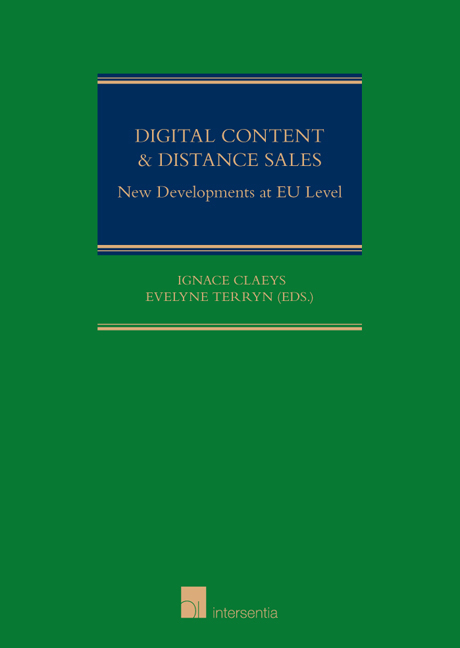Book contents
- Frontmatter
- Preface
- Contents
- List of Authors
- Part I Introduction
- Part II Proposals for a Directive on Online and Distance Sales of Tangible Goods and for a Directive on Digital Content
- Part III Proposal for a Regulation on Cross-Border Portability of Online Content Services in the Internal Market
- PART IV CONCLUSION
The New Proposals for Directives Concerning Digital Content and Online/Distance Sales: What Impact on Consumer Protection?
from PART IV - CONCLUSION
Published online by Cambridge University Press: 21 September 2018
- Frontmatter
- Preface
- Contents
- List of Authors
- Part I Introduction
- Part II Proposals for a Directive on Online and Distance Sales of Tangible Goods and for a Directive on Digital Content
- Part III Proposal for a Regulation on Cross-Border Portability of Online Content Services in the Internal Market
- PART IV CONCLUSION
Summary
INTRODUCTION
For the last decade European consumer law has been characterised by an increasing number of full, total or maximum harmonisation measures. The proposals for directives which are the subject of this chapter also introduce fully harmonised standards.
The preference for fully harmonised (minimal) standards of consumer protection fits well into the confidence-building policy of the European legislature, especially in fields which were formerly subject to minimum harmonisation. It also complements the Court of Justice‘s efforts to interpret existing (minimum) harmonisation directives concerning consumer contracts so as to reduce national divergences.
This creeping evolution towards minimal uniform standards became already apparent in a number of consumer contract directives, which contained conflict of laws rules limiting the choice for and application of the law of a third country provided the contract has a close link/connection with the territory of one or more Member States. The underlying reasons are well known: assuring consumers are confident in the legal environment in other Member States so that they will shop there, and furthermore encouraging under-confident businessmen to overcome their reluctance to risk doing business in other states if the legal regimes are not identical. This legislative technique pays off best in those areas in which freedom of contract alone is incapable of guaranteeing informed decisions.
In the same vein and in contrast with the minimum harmonisation character of the Consumer Sales Directive, the new proposals for directives concerning the supply of digital content and online and other distance sales of goods aim at the adoption of sets of uniform minimal standards. The proposals must be seen as a further step towards the creation of an internal market for digital content and services. Together with the proposal for a regulation on ensuring the cross-border portability of online content services in the internal market, the proposals for directives form one set of new rules.
According to the European Commission, the incoherence between the Member States leads to uncertainty both by businessman and consumers as to the applicable legal framework. Due to the complexity of this legal framework, businesses face additional costs when examining and adapting their contracts to specific mandatory rules, which make them reluctant to offer their goods and services across the internal market.
- Type
- Chapter
- Information
- Digital Content and Distance SalesNew Developments at EU Level, pp. 307 - 361Publisher: IntersentiaPrint publication year: 2017
- 1
- Cited by



